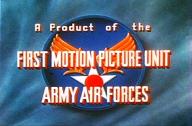First Motion Picture Unit
| 1st Motion Picture Unit 18th Army Air Forces Base Unit |
|
|---|---|

Credit screen
|
|
| Active | 1 July 1942 – December 1945 |
| Country |
|
| Branch |
|
| Type | Group |
| Role | Public Relations/Training film production |
| Size | 1,110 men |
| Headquarters | Hal Roach Studios, CA |
| Nickname(s) | Celluloid Commandos Hollywood Commandos |
| Motto(s) | We kill ’em with fil’m |
| Engagements | |
| Commanders | |
| Notable commanders |
Jack L. Warner Owen Crump Paul Mantz |
| Insignia | |
| 1st Motion Picture Unit emblem |  |
The First Motion Picture Unit (FMPU), later 18th Army Air Forces Base Unit, was the primary film production unit of the US Army Air Forces (USAAF) during World War II and was the first military unit made up entirely of professionals from the film industry. It produced more than 400 propaganda and training films, which were notable for being informative as well as entertaining. Films for which the unit is known include Resisting Enemy Interrogation, Memphis Belle: A Story of a Flying Fortress and The Last Bomb—all of which were released in theatres. Veteran actors such as Clark Gable, William Holden, Clayton Moore, and future President Ronald Reagan and directors such as John Sturges served with the FMPU. The unit also produced training films and trained combat cameramen. FMPU personnel served with distinction during World War II.
First Motion Picture Unit is also the eponymous title of a 1943 self-produced documentary about the unit narrated by radio and television announcer Ken Carpenter.
When the United States entered World War II in December 1941, the USAAF was a part of the army, and motion picture production was the responsibility of the Army Signal Corps. USAAF Commanding General "Hap" Arnold believed that the formation of an independent film entity would help lead to the air service gaining its independence. At a meeting in March 1942, General Arnold commissioned Warner Bros. head Jack L. Warner, producer Hal Wallis and scriptwriter Owen Crump to create the unit. Warner was made lieutenant colonel and Crump a captain but Wallis, who was then in production with Casablanca, did not accept the offer. Of immediate concern was a critical shortage of pilots and recruits. Arnold told Warner he needed 100,000 pilots, and contracted with Warner Bros. to produce and release a recruitment film, which would come to be known as Winning Your Wings.
...
Wikipedia
